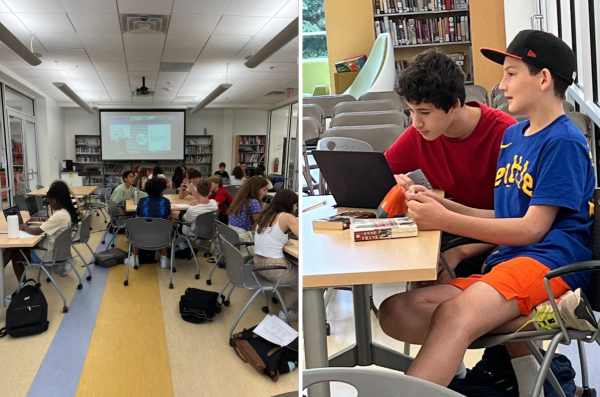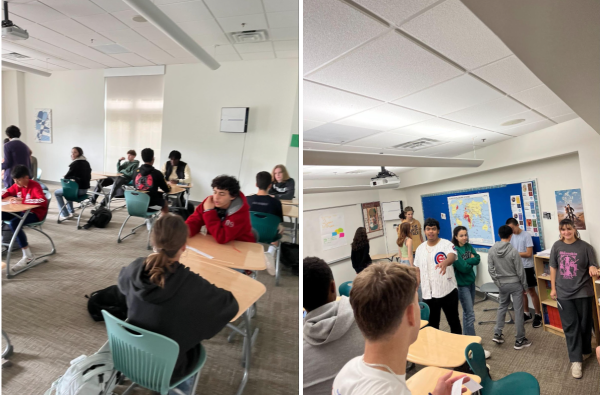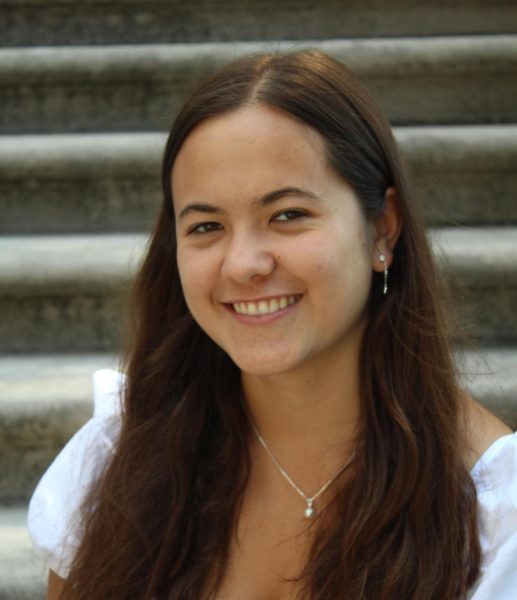Major curriculum changes have taken place at WIS since Dateline published an investigative piece in May revealing the lack of Holocaust education after “The Diary of Anne Frank” was removed from the middle school English curriculum.
According to Middle School Principal Randy Althaus, Dateline’s article highlighted “blind spots” in the existing curriculum review process. “We were surprised that this had happened, and we shouldn’t have been caught off guard by it,” he said.
Althaus cites a “broken system” that led to the gap in the curriculum. “We certainly never intended to exclude [the Holocaust] in the curriculum, and frankly, we should have had a system or mechanism in place to be able to [prevent] that,” he said.
After the article was published last spring, Associate Head of School Natasha Bhalla met with the Teaching and Learning Committee (TLC), which consists of principals and assistant principals across the divisions and the Director of Teaching and Learning, to determine how the gap came to be and whose responsibility it was to teach the Holocaust.
“The thing that struck me about this was that we were all working off the assumption that the teaching had been happening,” Bhalla said. “Who would think that you would have a school that didn’t have units on the Holocaust?”
Since May, teachers and administrators have been working to create solutions to the issue.
“We realized that we have a short and long problem, and that is: we need to get the Holocaust back in our curriculum, and we need to have a system in place where we don’t allow ourselves to have these types of blind spots again,” Althaus said.
This year, the seventh grade English department will teach “The Devil’s Arithmetic,” a historical fiction novel by Jane Yolen about a girl who travels back in time to the Holocaust.
Former middle school English teacher Sonia Chintha, who left WIS at the end of last school year, said Dateline’s reporting led her, the department coordinator at the time, to immediately re-consider the curriculum.
“We talk about antiracism so much [in the English curriculum], but really, there’s a connection that branches to other parts of oppression and hatred in this world, antisemitism being one of them,” Chintha said.
“Who would think that you would have a school that didn’t have units on the Holocaust?”
– Natasha Bhalla
The department chose to add “The Devil’s Arithmetic” to the curriculum because it allowed for Holocaust education as well as a chance to shed light on the “joys and pains” of Jewish community and identity, according to middle school English teacher and current department coordinator Marissa McCauley. Another important factor was that it was written by a Jewish author.
“I think one of the really beautiful things about this book is the way that it connects that history to a more modern-day time period because I think that’s something that resonates with all of us,” McCauley said. “We can learn about history, but I think we need to also be able to connect it to our lives today.”
Before and while reading the novel, students will learn about its historical context. “We want to give as much understanding as we can while also acknowledging that it’s not a full and complete history that we’re able to teach in English class,” McCauley said.
Using resources from the United States Holocaust Memorial Museum and the Anne Frank House, students will learn about Hitler’s rise to power, Nazi antisemitism, Jewish resistance to the Nazis, the pyramid of hate and genocide. They will also define the Holocaust, antisemitism and Nazi racism, and read first-hand testimonials of the Holocaust and poetry written by children in concentration camps.
The upper school English department also made revisions to their curriculum and will teach the graphic novel “Maus,” which is about the Holocaust, to next year’s twelfth graders.
According to upper school English teacher and department coordinator Nicholas Loewen, they chose this book as a way to cover the Holocaust and teach a graphic novel, a genre added to the IB curriculum only three years ago.
“We thought…that [teaching the book] would be a good way to include [Holocaust] information,” Loewen said. “It’s a really good book. It’s a canonical piece of literature.”
The department is also creating a memoir unit in ninth grade that gives students a choice of books, in which Loewen hopes to provide a “wider variety of voices for students to pick from,” such as Jewish, LGBTQ+ and other minority voices.

After three days of curriculum work over the summer, the upper school history department also revised their curriculum. They condensed existing topics in the tenth grade curriculum and added new ones to give students a broader education. Now they will teach the Civil War, Reconstruction, the development of U.S. democracy after the Civil War, the Interwar Period and the causes, consequences and social impact of World War I and II, including the Holocaust. The eleventh grade curriculum will still go into depth on the Interwar Period and Hitler’s rise and rule.
“The one thing that I found most gratifying about the process is that we were able to find ways to keep the focus on some of the bigger historical thinking questions and the skills while modifying the content in a way that I think is beneficial for all,” upper school history teacher and department coordinator Don Boehm said.
He believes that the bigger focus on the early 20th century will provide a foundation for all students to understand race and gender issues and international relations in the 20th century. “I hope that students find that they can understand some of these quite contentious issues challenging issues today,” Boehm said.
Though Boehm is still figuring out ways to modify the whole history curriculum in response to the changes, he is pleased with the new curriculum structure that teaches all students “key content.”
The middle school humanities department is currently undergoing curriculum review, a multi-year project already underway in all departments when the article was published. However, according to Althaus, the article helped “focus” the conversation. They are currently looking for ways to include non-ancient world history and create a more adaptive and thematic humanities curriculum.
To solve the long-term issue of communicating curriculum changes, Bhalla says the TLC is working to ensure there is a process to make sure departments “are acting in best faith.” They are also working to establish the standards for what the school teaches.
“[We want to make sure teachers] are making decisions that won’t have holistic implications,” Bhalla said. “That there’s a process in place to vet the decisions that departments are making.”
Director of Teaching and Learning Carole Geneix is working with the administration to create systems of documentation, alignment and approval for curriculum changes and continue the existing curriculum review cycle. She says Dateline’s article and the changes that followed have highlighted some priorities.
“It shows that student voice matters and that we should incorporate student voice in this curriculum process,” Geneix said. “It’s not exactly the responsibility of students, but I think this is something to keep in mind while we’re doing this curriculum review cycle.”
Director of International-Mindedness, Diversity and Inclusion (IDI) Aldaine Wynter, who is new this year, is hoping to incorporate more student feedback into the curriculum going forward. “I want to know what you want to see in your curriculum,” he said. “…If you feel that the school is not doing something, tell me, and then I can tell you why I think that’s the case or I can work with you to make a change.”
Wynter is currently implementing an IDI review component into the curriculum review cycle. It is an annual review for all departments to document what is being taught and reflect on what other voices should be represented. The system includes an assessment of whether content is taught in a sensitive and inclusive manner.
Wynter says his role is to help teachers across school divisions connect and communicate about what is being taught. “My role is to facilitate the opportunity for [teachers] to review what they’re teaching and to figure out whose voices are being amplified at this moment, in our course, in this year,” Wynter said.
“I don’t think that any story should come at the expense of another one.”
– Jenna Loescher-Clark
Senior Jake Drimmer, who is Jewish, noticed anger and disappointment among the Jewish community when they learned that “The Diary of Anne Frank” was no longer taught. He explained that he has long felt that Jewish voices were overlooked at WIS.
“I just feel like there’s a lack of representation,” Drimmer said. “So the fact that they’re at least trying to add more books… makes me feel better.”
However, Drimmer points out that the issue runs deeper, as other communities also feel underrepresented. He also feels there is a lack of acknowledgement of Jewish holidays and global issues affecting Jewish people, such as the rise in antisemitism and the Israel-Hamas war. “I understand WIS doesn’t want to take a stance,” he said. “But they don’t have to take a stance to talk about terrorism, to talk about hate.”
Senior International Student Union (ISU) Representative Jenna Loescher-Clark, who identifies as secular Jewish, had been aware of the removal of “The Diary of Anne Frank” from the middle school curriculum “almost immediately” after it occurred through word of mouth, even before the article was published.
Research and Media Specialist Lauren Olson asked Loescher-Clark and the other rising senior representatives in the spring to select a summer reading book for the rising freshmen’s Community Read, an initiative that began two years ago to connect the freshman class. Loescher-Clark suggested “The Diary of a Young Girl,” which she felt fit with the class of 2027’s yearlong theme of resilience.
“For me, it is really important to still have that really personal [narrative] about Anne Frank’s experience with the Holocaust,” Loescher-Clark said. “And I thought it would be a great show of perseverance for everyone to be able to come together and discuss at the end of the summer.”
Though she understood the reason for removing the book from the English curriculum to make room for other minority voices, Loescher-Clark felt Frank’s story was just as important.
“I think all of the stories that need to be told should be told, but I don’t think that any story should come at the expense of another one,” Loescher-Clark said. “I thought there was a different way to approach it…The Holocaust… was an incredibly important historical event for all parties involved. And [‘The Diary of a Young Girl’] really would be, with the way the history classes were previously set up, the only access to that [for students].”
Loescher-Clark sent a Google Form to the class of 2024 to gain their input on the book selection. 85.7% of the 21 responses chose “The Diary of a Young Girl.”
Before starting the book, the class of 2027 watched videos and read to gain background knowledge on the Holocaust. Over the summer, they read the book and conducted thinking routines in a packet created by Olson, Geneix and the history department. At the start of the school year, they unpacked the text in relation to the grade’s yearlong theme of resilience and made “upstander cards” about other people who have shown resilience in their lives. Each student presented their cards to a member of the class of 2024.

“I think what’s great about a book, and specifically [“The Diary of a Young Girl”], is that it is such a foundational text in the world,” Olson said. “That makes it a really important and accessible connection for everyone… [the Community Read is] really about how… we all come around the ideas that are in this book and then build our community from there.”
Bhalla is very content with the quick action teachers and administrators took when faced with the challenge of filling in the curricular gap.
“I think there was a sense of true reflection,” she said. “I think we were able to understand very quickly how it happened, [and] we were able to address it. And I think the product is reflective of that and something that I’m very proud of.”
Althaus is “relieved” that the Holocaust has been integrated into the curriculum again. “I do think it is such a human touchstone that [has] undeniably impacted the whole world,” he said. “…If we start forgetting things, like these lessons, then they’re replicated.”
By Naomi Breuer

































































